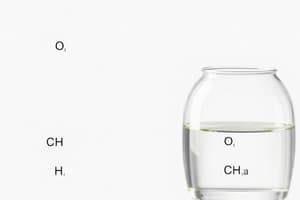Podcast
Questions and Answers
What happens when dilute hydrochloric acid is added to iron fillings?
What happens when dilute hydrochloric acid is added to iron fillings?
Hydrogen gas and iron chloride are produced.
What is a balanced chemical equation? Why should chemical equations be balanced?
What is a balanced chemical equation? Why should chemical equations be balanced?
A balanced chemical equation has an equal number of atoms of each element on both sides. Chemical equations should be balanced to satisfy the law of conservation of mass.
Translate the following statements into chemical equations and then balance them:
(a) Hydrogen gas combines with nitrogen to form ammonia.
(b) Hydrogen sulphide gas burns in air to give water and sulphur dioxide.
(c) Barium chloride reacts with aluminium sulphate to give aluminium chloride and a precipitate of barium sulphate.
(d) Potassium metal reacts with water to give potassium hydroxide and hydrogen gas.
Translate the following statements into chemical equations and then balance them: (a) Hydrogen gas combines with nitrogen to form ammonia. (b) Hydrogen sulphide gas burns in air to give water and sulphur dioxide. (c) Barium chloride reacts with aluminium sulphate to give aluminium chloride and a precipitate of barium sulphate. (d) Potassium metal reacts with water to give potassium hydroxide and hydrogen gas.
Answers will vary based on the balanced chemical equations for each statement.
Balance the following chemical equations:
(a) $HNO3 + Ca(OH)2 → Ca(NO3)2 + H2O$
(b) $NaOH + H2SO4 → Na2SO4 + H2O$
(c) $NaCl + AgNO3 → AgCl + NaNO3$
(d) $BaCl2 + H2SO4 → BaSO4 + HCl$
Balance the following chemical equations: (a) $HNO3 + Ca(OH)2 → Ca(NO3)2 + H2O$ (b) $NaOH + H2SO4 → Na2SO4 + H2O$ (c) $NaCl + AgNO3 → AgCl + NaNO3$ (d) $BaCl2 + H2SO4 → BaSO4 + HCl$
Flashcards are hidden until you start studying


